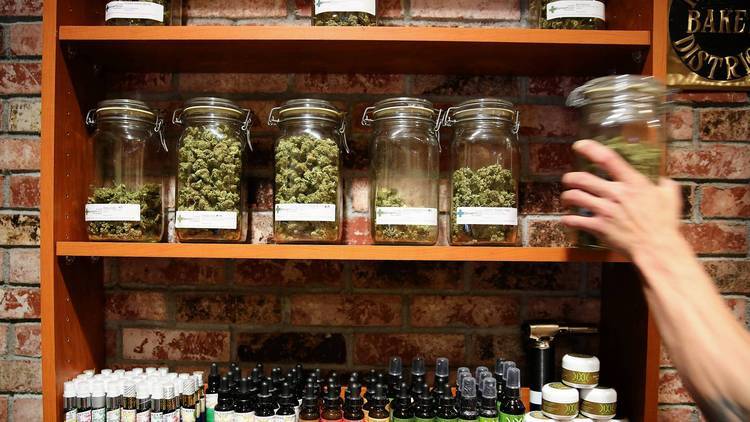Post-traumatic stress disorder, along with migraines and irritable bowel syndrome, have been recommended as additions to the list of conditions that can be treated by medical marijuana in Illinois.
~
Also receiving a recommendation for approval Monday were osteoarthritis and two forms of nerve damage, including diabetic neuropathy.
But diabetes itself, as well as anxiety, did not receive endorsements by a state panel in Chicago.
The Illinois Medical Cannabis Advisory Board met on Monday to consider a number of new disorders to add to the list of conditions that qualify someone to get access to medical marijuana. Its recommendations will be passed on to the Illinois Department of Public Health, which will ultimately decide which conditions are added to the list.
Monday afternoon, the panel unanimously approved the use of medical marijuana for people with PTSD, after hearing from two military veterans and a young woman who said she suffered from the stress disorder after being in abusive relationships as a teen.
Daniel Jabs, a veterans peer support specialist who joined the military in 1999, said that other types of medications for PTSD can be deadly.
"I think it's about time we treat our veterans, rather than (as) criminals, as people with certain scars when they come back," he said.
One person who spoke against providing marijuana to treat PTSD said drug’s long-term effects on PTSD are unclear and could cause paranoia and psychosis. She added that those who suffer from PTSD are at a greater risk of abusing marijuana and have more difficulty recovering from marijuana addiction.
But the committee was clearly in favor of adding PTSD to the list.
"This one is very straightforward in my mind," said Dr. Eric Christoff, a general internist and HIV specialist at Northwestern Medicine who sits on the advisory board. "The risk of not correctly, in a patient-centered way, addressing PTSD is death or suicide, so the stakes are high."
Earlier Monday morning, the panel voted 8-2 against recommending to the Illinois Department of Public Health anxiety as a qualifying condition.
Critics of adding both anxiety and migraines to the list said they represented categories that were too broad, though the panel did ultimately recommend by an 8-2 vote that migraines be added to the list of qualifying conditions.
The panel voted unanimously to recommend cannabis for irritable bowel syndrome, stating that it is a more specific condition without many treatment options.
There are currently about three dozen conditions that allow qualifying patients to use medical marijuana. But after a series of delays in licensing cultivation centers and dispensaries, patients are still waiting to get the drug.
Diabetes was rejected on the basis that there is no evidence that marijuana has anti-glycemic properties and could raise blood sugar, panel members said.
The recommending board also voted against marijuana to treat the blood disorder essential thrombocythemia, which commonly causes headaches in sufferers. The panel said those who have the disorder would be better served under the migraine category.
The votes in favor of periphery polyneuropathy and diabetic neuropathy were unanimous.
Those conditions are difficult to treat, panelists said. Board member James Champion, who suffers from multiple sclerosis and has himself been approved to use medical pot, said he was shocked that the nerve-damage disorders were not part included in the original law.
"The feeling that your feet are frozen in a block of ice or like they're on fire is not a pleasant feeling at all," he said. "I know neuropathy is very painful, very, very painful."
The vote in favor of recommending osteoarthritis was 7-4.
Jared Taylor, who spoke in favor of the recommendation, said that other treatments like painkillers may reduce pain but not inflammation and may cause liver damage.
While the panel expressed concern that category, too, was too broad, others said that there needs to be trust in the medical professional who would be prescribing the drug.
"I don't think we need to be overly concerned about opening the floodgates," Christoff said.
~





